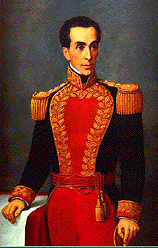July 24: Simón Bolívar
Simón Bolívar (1783)
It was on this date, July 24, 1783, that South American liberator and president Simón José Antonio de la Santísima Trinidad Bolívar - Simón Bolívar - was born in Caracas, Venezuela. His parents were wealthy, but they died early. Bolívar inherited a fortune that assured him of a quality education, partly in Spain. He traveled Europe, and briefly in the United States. Bolívar found the writings of Rousseau particularly compelling, along with other writers of the 18th-century European Enlightenment.
On his return to Venezuela, on fire with democratic and anti-clerical ideas learned in Europe, in 1810 Bolívar joined a group of revolutionists bent on overthrowing the Spanish throne and church. He applied to England for help, receiving instead a promise of neutrality. He returned again, took Caracas by his own devices, was expelled, and found victories elsewhere. Eventually he won independence from Spain for Panama, Colombia, Ecuador, Peru, and Venezuela. In 1819 he became President of the Republic of Colombia. Four years later, at the age of 40, he was chosen Dictator of Peru, after its liberation. Upper Peru was organized into a separate Republic, called Bolivia in his honor. He became Bolivia's first President and drew up its constitution. By 1825, Bolívar governed an area extending from the Caribbean to Argentina.
He was called El Liberator (The Liberator) and the "George Washington of South America." An excellent speaker and writer - most memorably of the Cartagena Manifesto and the Jamaica Letter - Bolívar had a vision of uniting South American, Central American and the Caribbean countries into a United States of Latin America, an economically independent country similar in some respects to the European Union.
In his Jamaica Letter, Bolívar discussed civil liberties such as political equality and freedom of religion in terms he learned from reading Rousseau and Locke. He borrowed his views on civic responsibilities from Plato and Cicero. The new nations of South America, Bolívar argued, needed "the care of paternal governments to heal the sores and wounds of despotism and war." In his Essay on Public Education, Bolívar viewed education as a tool for governments to educate their residents to their responsibilities and duties as participatory citizens. Insisting, in his Message to the Congress of Bolivia, that a body of Censors should act as the state's "moral authority," Bolívar argued that "without responsibility and restraint, the nation becomes chaos." He reassured those reading his Cartagena Letter that a strong government, far from acting despotic, would instead allow the state "to use force in order to liberate peoples who are ignorant of the value of their rights."
Bolívar was aware of the weaknesses and limits of liberal democracy, which is why he insisted on the necessity of a strong, republican form of government, with emphasis on the common good over individual rights. Sadly, his vision of a United States of Latin America was not to be: Clericals, who resented his atheism, united with Republicans, who resented the sternness of his government. He resigned the presidency in 1828 and exiled himself. Simón Bolívar died from tuberculosis on 17 December 1830, poor and unpopular, in Santa Marta, Colombia. His birthday in Venezuela is a national holiday.
Originally published July 2003 by Ronald Bruce Meyer.


